Home » University of Ghana (UG) – Ghana
University of Ghana (UG) – Ghana
GESTION DES ZONES MARINES ET CÔTIÈRES EN AFRIQUE DU NORD ET DE L’OUEST (MARCNOWA)
Les zones marines et côtières d’Afrique de l’Ouest et du Nord sont essentielles à la subsistance de millions de personnes, car elles leur fournissent de la nourriture, des revenus et d’autres ressources essentielles. Cependant, la région est confrontée à des défis importants en matière de gestion durable de ces ressources. Parmi les problèmes qui menacent l’environnement marin et côtier, citons la pêche illégale, la pollution par les hydrocarbures, la sécurité en mer et l’érosion côtière MarCNoWA fournit aux décideurs des informations et des outils d’observation de la Terre pour une gestion efficace des ressources marines et côtières régionales.
Responsable du Consortium : University of Ghana (UG) – Ghana.
Couverture Géographique : Le projet MarCNoWA couvre 18 pays côtiers d’Afrique de l’Ouest et du Nord, notamment l’Algérie, le Bénin, le Cap-Vert, la Côte d’Ivoire, l’Égypte, le Ghana, la Gambie, la Guinée, la Guinée-Bissau, le Liberia, la Libye, le Ma- roc, la Mauritanie, le Nigeria, le Sénégal, la Sierra Leone, la Tunisie et le Togo.
Orientation : Évolution du Littoral, Marées Noires, ZPP et Trafic Maritime, Météo Océanique.
Site Web : http://geoportal.gmes.ug.edu.gh
MARINE AND COASTAL AREAS MANAGEMENT IN NORTH AND WEST AFRICA (MARCNOWA)
Marine and coastal areas in West and North Africa are critical to the livelihoods of millions of people, providing food, income, and other essential resources. However, the region faces significant challenges in managing these resources sustainably. Illegal fishing, oil pollution, safety at sea, and coastal erosion are some issues that threaten the marine and coastal environment. MarCNoWA provides decision-makers with Earth observation information and tools for effectively managing regional marine and coastal resources.
Consortium Leader: University of Ghana (UG) – Ghana.
Coverage: The MarCNoWA project covers 18 coastal countries in West and North Africa, including Algeria, Benin, Cape Verde, Côte d’Ivoire, Egypt, Ghana, Gambia, Guinea, Guinea Bissau, Liberia, Libya, Mauritania, Morocco, Nigeria, Senegal, Sierra Leone, Tunisia and Togo.
Focus: Coastline Changes, Oil Spills, PFZs & Vessel Traffic, Ocean Weather.
Website: http://geoportal.gmes.ug.edu.gh
MARINE AND COASTAL AREAS MANAGEMENT IN NORTH AND WEST AFRICA (MARCNOWA)
Marine and coastal areas in West and North Africa are critical to the livelihoods of millions of people, providing food, income, and other essential resources. However, the region faces significant challenges in managing these resources sustainably. Illegal fishing, oil pollution, safety at sea, and coastal erosion are some issues that threaten the marine and coastal environment. MarCNoWA provides decision-makers with Earth observation information and tools for effectively managing regional marine and coastal resources.
Consortium Leader: University of Ghana (UG) – Ghana.
Coverage: The MarCNoWA project covers 18 coastal countries in West and North Africa, including Algeria, Benin, Cape Verde, Côte d’Ivoire, Egypt, Ghana, Gambia, Guinea, Guinea Bissau, Liberia, Libya, Mauritania, Morocco, Nigeria, Senegal, Sierra Leone, Tunisia and Togo.
Focus: Coastline Changes, Oil Spills, PFZs & Vessel Traffic, Ocean Weather.
Website: http://geoportal.gmes.ug.edu.gh
Publications
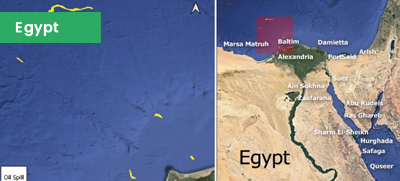
Hernessing Earth Observation for Effective Oil Spill Monitoring in Egypt
Oil spills pose significant environmental and economic risks to marine ecosystems and coastal livelihoods. The MarCNoWA Project, under the GMES and Africa Programme, developed
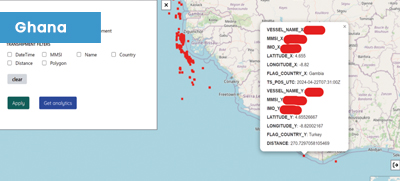
Leveraging Earth Observationfor Sustainacble Fisheries:MMCC Zone F’S Role in Combating IUU Fishing in West Africa
West Africa’s coastal waters are vital to the region’s economy and the livelihoods of millions, but their sustainable management is threatened by challenges such
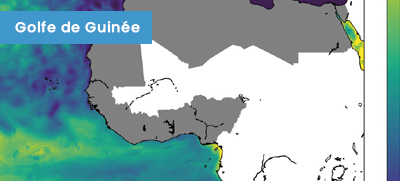
Enhancing Sustainable Fisheries Management in the Gulf of Guinea with GMES & Africa’s Potential Fishing Zone Products
The Gulf of Guinea’s fisheries face growing threats from overfishing and illegal activities, prompting six West African nations to establish the FCWC in 2007
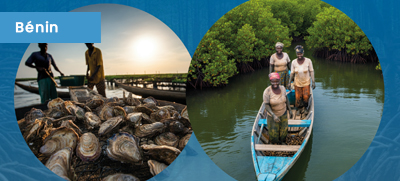
Monitoring Mangrove Ecosystems to Advance Sustainable Oyster Farming in Benin
In Benin provides information on the distribution and extent of mangroves to coastal communities. This initiative aimed to educate female oyster farmers on sustainable
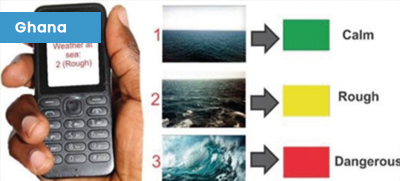
Ensuring Safety for Ghana’s Fishermen: The Role of GMES and Africa’s Marine Weather Service
Since 2014, associations and groups of artisanal fishermen have emphasized the critical need for timely and accurate marine weather and ocean state information to


